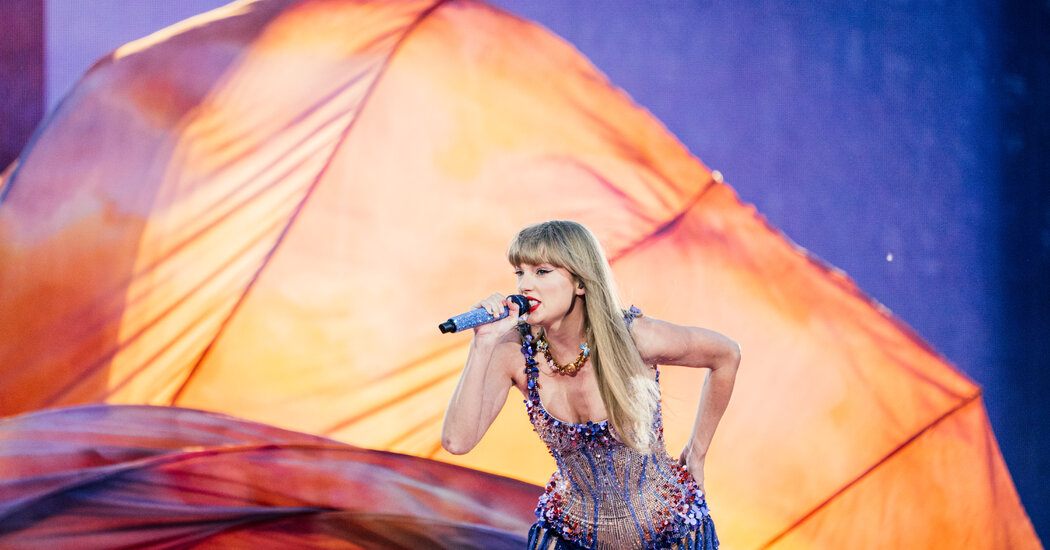The Justice Department on Thursday sued Live Nation Entertainment, the concert giant that owns Ticketmaster, asking a court to break up the company over claims it illegally maintained a monopoly in the live entertainment industry.
In the lawsuit, which is joined by 29 states and the District of Columbia, the government accuses Live Nation of dominating the industry by locking venues into exclusive ticketing contracts, pressuring artists to use its services and threatening its rivals with financial retribution.
Those tactics, the government argues, have resulted in higher ticket prices for consumers and have stifled innovation and competition throughout the industry. The suit asks the U.S. District Court for the Southern District of New York to order “the divestiture of, at minimum, Ticketmaster,” and to prevent Live Nation from engaging in anticompetitive practices.
“It is time for fans and artists to stop paying the price for Live Nation’s monopoly,” Merrick Garland, the attorney general, said on Thursday. “It is time to break up Live Nation-Ticketmaster. The American people are ready for it.”
The suit is part of a broader push by American regulators to rein in the growing power of companies in the internet age, testing century-old antitrust laws against new power wielded by major corporations over consumers. The Justice Department has sued Apple and brought two cases against Google, while the Federal Trade Commission has brought antitrust suits against Amazon and Meta.
The Justice Department’s latest lawsuit is a direct challenge to the business of Live Nation, a colossus of the entertainment industry and a force in the lives of musicians and fans alike. The case, filed 14 years after the government approved Live Nation’s merger with Ticketmaster, has the potential to transform the multibillion-dollar concert industry.
Live Nation’s scale and reach far exceed those of any competitor, encompassing concert promotion, ticketing, artist management and the operation of hundreds of venues and festivals around the world. “Live Nation has its tentacles in virtually every aspect of the live entertainment industry,” the government says in its complaint.
According to the Justice Department, Live Nation controls around 60 percent of concert promotions at major venues around the United States and roughly 80 percent of primary ticketing at major concert venues.
Lawmakers, fans and competitors have accused the company of engaging in practices that harm rivals and drive up ticket prices and fees. At a congressional hearing early last year, prompted by a Taylor Swift tour presale on Ticketmaster that left millions of people unable to buy tickets, senators from both parties called Live Nation a monopoly.
In its complaint, the Justice Department refers to the many add-on fees as “essentially a ‘Ticketmaster Tax’ that ultimately raise the price fans pay.”
In response to the suit, Live Nation denied that it was a monopoly and said that breaking it up would not result in lower ticket prices or fees. According to the company, artists and sports teams are primarily responsible for setting ticket prices, and other business partners, like venues, take the lion’s share of surcharges.
In a statement, Dan Wall, Live Nation’s executive vice president of corporate and regulatory affairs, said that the Justice Department’s suit followed “intense political pressure.”
The government’s case, Mr. Wall added, “ignores everything that is actually responsible for higher ticket prices, from increasing production costs to artist popularity, to 24/7 online ticket scalping that reveals the public’s willingness to pay far more than primary tickets cost.”
The company also says its market share for ticketing has decreased in the recent years as it competes with rivals to win business.
Amy Klobuchar, Democrat of Minnesota, who chaired the Senate Judiciary hearing on Live Nation last year, cheered the Justice Department’s suit, including its request to break up the company.
“Live Nation keeps getting bigger and bigger, dominating more and more,” Ms. Klobuchar said in an interview after the suit was filed. “The fact that they’re coming out big and asking for a breakup, I think is the right thing to do as a remedy.”
The Justice Department allowed Live Nation, the world’s largest concert promoter, to buy Ticketmaster in 2010 under certain conditions laid out in a legal agreement. If venues did not use Ticketmaster, for example, Live Nation could not threaten to pull concert tours.
In 2019, however, the Justice Department found that Live Nation had violated those terms, and it modified and extended its agreement with the company.
Bill Kovacic, a former chairman of the Federal Trade Commission, said Wednesday that a lawsuit against the company would be a rebuke of earlier antitrust officials who had allowed the company to grow to its current size.
“It’s another way of saying earlier policy failed and failed badly,” he said.
The Justice Department argued in its lawsuit Thursday that Live Nation exploited relationships with partners to keep competitors out of the market. It requests a jury trial.
A key piece of the Justice Department’s case hinges on Live Nation’s interrelated businesses. Because it puts on concerts, tickets them, seeks sponsors for them and then manages artists who perform them, it can use each piece to benefit the others. That makes it harder for rivals to compete and hurts the ability of new competitors to emerge, the suit argues.
The government’s complaint argued that Live Nation threatened venues with losing access to popular tours if they did not use Ticketmaster. That threat could be explicit or simply an implication communicated through intermediaries, the government said, adding it could also block artists who did not work with the company from using its venues.
Additionally, Live Nation has acquired a number of smaller companies — something Live Nation described in internal documents as eliminating its biggest threats, according to the government.
One such deal was for AC Entertainment, a regional concert promoter that had a role in Bonnaroo, a popular music and arts festival in Tennessee. Live Nation pursued a deal to buy it in 2016 even though the company had doubts about the economics of the acquisition, according to the complaint.
A senior Live Nation executive said the deal “feels more like a defensive move” against AEG, Live Nation’s biggest competitor as a nationwide concert promoter, according to the complaint.
The Justice Department also accused Live Nation of anticompetitive behavior with the Oak View Group, a venue company co-founded by Live Nation’s former executive chairman. Oak View Group has avoided bidding against Live Nation when it comes to working with artists and it has influenced concert venues to sign deals with Ticketmaster, the government argues.
In 2016, Live Nation’s chief executive complained in an email that the Oak View Group had offered to promote an artist that had previously worked with Live Nation. Oak View Group backed down, according to the government.
“Our guys got a bit ahead,” its chief executive replied in an email, according to the government. “All know we don’t promote and we only do tours with Live Nation.”
The suit also highlights differences between the concert business in the United States, where venues tend to have exclusive deals with ticketing companies, and elsewhere in the world, where venues have “open” deals allowing competition between those selling tickets.
“Today, fans pay more in fees associated with live music concert tickets in America than other parts of the world,” according to the complaint.
The Justice Department’s latest investigation of Live Nation began in 2022. Live Nation simultaneously ramped up its lobbying efforts, spending $2.4 million on federal lobbying in 2023, up from $1.1 million in 2022, according to filings available through the nonpartisan website OpenSecrets.
In April, the company co-hosted a lavish party in Washington ahead of the annual White House Correspondents’ Association dinner that featured a performance by the country singer Jelly Roll and cocktail napkins that displayed positive facts about Live Nation’s impact on the economy, like the billions it says it pays to artists.
Under pressure from the White House, Live Nation said in June that it would begin to show prices for shows at venues it owned that included all charges, including extra fees. The Federal Trade Commission has proposed a rule that would ban hidden fees.
The Justice Department’s suit drew praise from some fans.
Victoria Addison, a lifelong Swift fan, said she views Live Nation’s hold over the industry as the reason she was unable to get tickets to the star’s Eras Tour. “I love Taylor so much but just couldn’t justify spending thousands more for tickets,” Ms. Addison said.
“It’s about time,” said Justin Ward, who runs a blog about live music. “I have no idea why the original merger was allowed to go through.”
Julia Jacobs contributed to this report.




